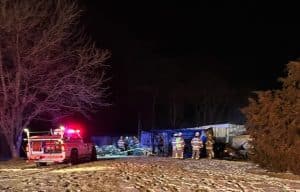WHS hosts education funding committee
A wide range of leaders from across the state met Monday afternoon at Waterloo High School to discuss the condition of education funding.
The meeting, hosted in the auditorium, was part of a series of meetings of state senators and representatives who make up the Illinois Senate Education Funding Advisory Committee.
This committee’s role is to examine the state’s current education funding system and propose a system that provides adequate, equitable, transparent, and accountable distribution of funds to school districts that will prepare students for achievement and success after high school.
The advisory committee is made up of eight members appointed by the Illinois Senate president and the Senate minority leader.
Waterloo superintendent Jim Helton opened the meeting with remarks about what adequate public education is defined as.
“We understand the fiscal constraints of the state,” he said. “But to believe that we get everything for nothing is a fool’s game. General state aid needs to be federally funded, because re-slicing the pie will not solve the problem.”
State Senator Andy Manar noted there have been six or seven meetings similar to Monday’s that have taken place across the state with the same goal.
“We have an important task here that we’ve talked about over and over,” he said. “It’s been a realistic and oftentimes difficult discussion. Not every change is going to happen.”
Also attending the meeting was Lt. Governor Sheila Simon, who stressed the importance of allocating money appropriately throughout the state.
“There’s a failure in Illinois public schools that we have to recognize. We have to recognize the failure on our part to be equitable and adequate in terms of funding,” she said. “Now is the time to tackle this, think big and be bold.”
Simon’s goals include when certain areas in need are targeted, the money needs to actually get to those schools.
She wants the committee to handle proration, which is the way the state handles its payments when funding falls short of what is it supposed to be.
After remarks from a number of committee members, the meeting shifted into a discussion period moderated by Mike Griffith of the Education Commission of the States and State Superintendent Chris Koch.
Meeting members covered an agenda that included both state funding issues and formula issues.
Funding issues included the policy options of maintaining current funding levels and adding resources as the state budget grows over time, increasing funding without identifying additional revenue sources, increasing funding and identifying revenue sources and recommending that a study be undertaken to identify if additional state funding is needed.
Formula issues the committee addressed included transportation, minimum state payments regional cost differences, special education and several other key factors.
To make decisions, the committee is required to take into consideration several aspects of a school: the number of students in a school and school district and the level of need of those students; a school district’s ability to provide local resources; transparency and accountability; revenue predictability; and the long-term implications and outcomes of the funding system.
The committee will continue to meet in communities across the state.
Their next stop is Jan. 27 in the Chicago Public Schools.






